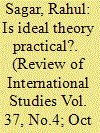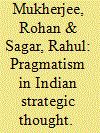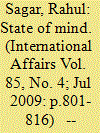|
|
|
Sort Order |
|
|
|
Items / Page
|
|
|
|
|
|
|
| Srl | Item |
| 1 |
ID:
114995


|
|
|
|
|
| Publication |
2011.
|
| Summary/Abstract |
This article examines how the exemplars of ideal theory have addressed what I term 'the problem of preservation'. The 'problem' in question is not so much that a political community must make provisions for its self-preservation, but rather that its provisions must correspond to the intentions and capabilities of its neighbours. This constraint implies that the ability of a political community to pursue ideals rather than power depends heavily on who its neighbours happen to be. This article shows how Aristotle, Rousseau, Kant, and Rawls address this problem by recommending measures such as defensive fortification, collective security, and democratic peace, which, they claim, will dampen the anarchic nature of the international system. It argues that the implausibility of these measures renders the ability of political communities to heed the moral guidance offered by ideal theory contingent at best and impractical at worst. If proponents of ideal theory wish to resist this conclusion, then they must offer a more persuasive answer to the problem of preservation.
|
|
|
|
|
|
|
|
|
|
|
|
|
|
|
|
| 2 |
ID:
158428


|
|
|
|
|
| Summary/Abstract |
Although contemporary Indian strategic thought is described in terms of various schools, most scholars agree that prior to the end of the Cold War there prevailed a so-called Nehruvian consensus on India’s strategic objectives. This consensus was allegedly idealist, emphasizing autonomy, peaceful co-existence, and Third World anti-imperialist leadership. We argue that this characterization ignores numerous alternative views on Indian strategy that thrived in elite debates outside the uppermost echelons of power. Many of these views were grounded in pragmatism, or a flexible approach to considerations of power and material interest that eschewed dogmatic thinking, be it high moralism or offensive bluster. Through a case study of India’s response to China’s emerging nuclear program following the latter’s first nuclear test in 1964, we highlight the role that pragmatism played in the national debate and the way it shaped the strategic options considered by the elite at the time.
|
|
|
|
|
|
|
|
|
|
|
|
|
|
|
|
| 3 |
ID:
091634


|
|
|
|
|
| Publication |
2009.
|
| Summary/Abstract |
As its economic power, military strength and cultural influence expands, India draws ever closer to becoming a leading player in world politics. Yet relatively little is known about what Indians take to be the nature of international politics and, correspondingly, how their power and influence should be used. A survey of Indian political thought reveals sharp disagreements. Moralists wish for India to serve as an exemplar of principled action. Hindu nationalists want Indians to act as muscular defenders of Hindu civilization; strategists advocate cultivating state power by developing strategic capabilities; and liberals seek prosperity and peace by increasing trade and interdependence. This article argues that current trends indicate that India will increasingly prioritize its quest for prosperity and peace. But if this quest is thwarted by external threats, then calls to enhance India's military power will most probably grow louder, and be heeded more closely.
|
|
|
|
|
|
|
|
|
|
|
|
|
|
|
|
| 4 |
ID:
053732


|
|
|
|
|
| Publication |
2004.
|
| Description |
p115-135
|
| Summary/Abstract |
Relations between India and America have always been unsettled. Misunderstanding on both sides reached an apogee with India's 1998 nuclear tests. Despite a significant thaw towards the end of the Clinton administration, relations between the two countries have yet to stabilise, not least because of Indian unease over the post-11 September policies and strategies of the Bush administration, in particular, American support for Pakistan. In fact, the points of friction are more widespread, arising from the very different positions that India and America occupy in the international system. While the differences are not irreconcilable, expectations must be carefully managed. Both sides should work more strenuously to realise the strategic and moral implications of their desired alliance. Failing this, they may inadvertently sow further distrust.
|
|
|
|
|
|
|
|
|
|
|
|
|
|
|
|
|
|
|
|
|